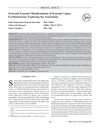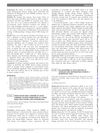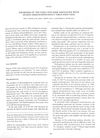 October 2023 in “Acta dermato-venereologica (Print)”
October 2023 in “Acta dermato-venereologica (Print)” People with severe hair loss have lower zinc levels in their blood.
3 citations,
September 2021 in “JAAD case reports” Denosumab, a bone loss treatment, may cause hair loss and skin reactions due to immune system effects.
 June 2023 in “Stem cell reviews and reports”
June 2023 in “Stem cell reviews and reports” Stem cell therapies could be a promising alternative for hair loss treatment, but more research is needed to understand their full potential and safety.
 November 2022 in “Journal of The Pakistan Dental Association”
November 2022 in “Journal of The Pakistan Dental Association” Oral ulcers are common in SLE patients and often link to other symptoms.
 March 2022 in “Benha Journal of Applied Sciences”
March 2022 in “Benha Journal of Applied Sciences” ULBP3 levels are higher in Tinea capitis patients and may help predict the disease's severity.

Dutasteride can stabilize hair loss in patients with frontal fibrosing alopecia, but its safety in women is unclear, so use it with caution.
 20 citations,
December 2016 in “Neurodegenerative disease management”
20 citations,
December 2016 in “Neurodegenerative disease management” Teriflunomide effectively reduces relapses and disability in MS and has a manageable safety profile.
23 citations,
July 2021 in “International journal of laboratory hematology” An 84-year-old man developed severe anemia after his first COVID-19 vaccine shot, improved with treatment, and was advised against a second dose.
 34 citations,
June 2014 in “The BMJ”
34 citations,
June 2014 in “The BMJ” Pregnancy can change skin disease severity, with some conditions improving and others worsening, and treatment should balance benefits and fetal safety.
 1 citations,
August 2000 in “Expert Opinion on Therapeutic Patents”
1 citations,
August 2000 in “Expert Opinion on Therapeutic Patents” Boosting mitochondrial energy production with supplements like acetyl-L-carnitine may improve aging-related cellular function and health conditions.
1 citations,
May 2024 in “International Journal of Molecular Sciences” Adenosine receptors could be promising targets for treating inflammatory skin diseases like psoriasis.
 21 citations,
November 2012 in “Plastic and Reconstructive Surgery”
21 citations,
November 2012 in “Plastic and Reconstructive Surgery” Both genetic and lifestyle factors significantly affect female hair loss.
 January 2017 in “Journal of Investigative Dermatology Symposium Proceedings”
January 2017 in “Journal of Investigative Dermatology Symposium Proceedings” The 2015 Hair Research Congress concluded that stem cells, maraviroc, and simvastatin could potentially treat Alopecia Areata, topical minoxidil, finasteride, and steroids could treat Frontal Fibrosing Alopecia, and PTGDR2 antagonists could also treat alopecia. They also found that low-level light therapy could help with hair loss, a robotic device could assist in hair extraction, and nutrition could aid hair growth. They suggested that Alopecia Areata is an inflammatory disorder, not a single disease, indicating a need for personalized treatments.
 84 citations,
July 2003 in “European journal of biochemistry”
84 citations,
July 2003 in “European journal of biochemistry” Mouse skin can produce and process serotonin, with variations depending on hair cycle, body location, and mouse strain.
 11 citations,
November 2015 in “Journal of Functional Foods”
11 citations,
November 2015 in “Journal of Functional Foods” Hibiscus petals improved blood sugar and stress responses in diabetic rats.
 61 citations,
May 2015 in “Planta”
61 citations,
May 2015 in “Planta” Certain fungi and bacteria help orchid seeds germinate and plants grow better.
October 2023 in “F1000Research” TB lymphadenitis can occur in people with SLE on long-term immunosuppressive therapy.
 1 citations,
January 2024 in “Journal of Cutaneous and Aesthetic Surgery”
1 citations,
January 2024 in “Journal of Cutaneous and Aesthetic Surgery” Fractional CO2 laser with topical triamcinolone is more effective and safer for treating alopecia areata than intralesional triamcinolone.

Stem cells regenerate tissues and their behavior varies by environment, suggesting the hematopoietic system model may need revision.
 February 2022 in “Research Square (Research Square)”
February 2022 in “Research Square (Research Square)” High TSPEAR levels in colorectal cancer predict worse outcomes.
June 2013 in “International Journal of Dermatology” Central lipohypertrophy in HIV-infected women may lead to shorter eyelashes.

Many patients with cutaneous lupus erythematosus experience hair loss and nail problems, which are important for diagnosis and treatment.
 48 citations,
July 1992 in “International Journal of Dermatology”
48 citations,
July 1992 in “International Journal of Dermatology” HIV can cause various nail and hair disorders, important for early diagnosis and treatment.
 52 citations,
September 2018 in “International Journal of Molecular Sciences”
52 citations,
September 2018 in “International Journal of Molecular Sciences” Ginseng and its compounds may help hair growth and prevent hair loss, but more human trials are needed to confirm this.
 3 citations,
February 1976 in “Pediatric Clinics of North America”
3 citations,
February 1976 in “Pediatric Clinics of North America” The conclusion is that effective cancer treatment often requires a combination of therapies, but must be carefully managed due to serious side effects and the risk of immunosuppression.
 9 citations,
January 2014 in “World journal of gastroenterology”
9 citations,
January 2014 in “World journal of gastroenterology” A gluten-free diet stopped a child's hair-eating behavior and suggested she had celiac disease.
 June 2022 in “International Journal of Health Sciences (IJHS) (En línea)”
June 2022 in “International Journal of Health Sciences (IJHS) (En línea)” Pregnant women with hair loss often have low zinc and iron levels.
 2 citations,
April 2018 in “Natural Product Communications”
2 citations,
April 2018 in “Natural Product Communications” Cynomorium songaricum has many health benefits and could help with hair regrowth.
 2 citations,
September 2022 in “Asian Journal of Microbiology, Biotechnology & Environmental Sciences”
2 citations,
September 2022 in “Asian Journal of Microbiology, Biotechnology & Environmental Sciences” Zinc is essential for plant growth and human health.
February 2024 in “Frontiers in Cell and Developmental Biology” Eribulin-based chemotherapy is more effective and has fewer side effects for advanced triple-negative breast cancer.
























